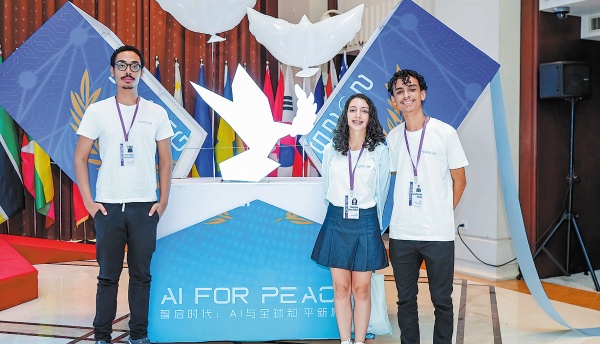Global youths empower AI for world peace
Young leaders from 38 countries collaborate to harness AI's power for building a peaceful, just, and inclusive global future.


Guided by the Chinese People's Association for Friendship with Foreign Countries, the event was jointly hosted by Fudan University and Shanghai Rong Chang Public Welfare Foundation.
Organizers noted that AI governance is crucial to the future of humanity and called on young people to take on greater responsibilities, stand at the forefront, and contribute innovative, inclusive, and forward-looking plans.
"The young participants were intellectually active, proposing a large number of innovative solutions from various dimensions — such as early warning for conflicts, social reconciliation, and harmony in international relations," said Su Changhe, dean of Fudan University's School of International Relations and Public Affairs. "They demonstrated the infinite possibilities of AI in advancing peaceful governance."
The "Most Valuable Project" award went to a team from China, Pakistan, Georgia, Colombia, Japan, and Thailand. Their proposal, "GAIA Voice", is a global AI system integrating ecology, community, and technology to address climate change and resource management crises, while promoting global ecological peace and sustainable development.
Inspired by Chile's decade-long drought and the decline of bee populations, the system monitors bee sounds in real time to detect pollination crises and guide farmers in scientific irrigation and planting, the team said.
The system features five core functions: natural-human translator, AI warning mechanism, ecological guardian, restoration planner, and ecological peace narrator. Together, they promote deeper interconnection between humans and nature, paving the way for intelligent ecological governance and cross-border cooperation.
Another team, from Japan's Tokyo University and Sweden's Chalmers University of Technology, also drew wide acclaim for its plan to deepen research on ocean carbon sinks to support carbon neutrality strategies.
Their project proposed an AI-driven monitoring and prediction system based on long-term observation data of recalcitrant dissolved organic carbon in Tokyo Bay.
They said the project aims not only to improve the transparency and accuracy of ocean carbon accounting but also to serve as a platform for regional cooperation in East Asia, fostering cross-border sharing and technological trust, and providing data support and institutional innovation for global climate peace governance.
A third team, with members from Sweden, Indonesia, Montenegro, and other countries, focused on humanitarian crises caused by the mismanagement of emergency supplies following natural disasters. They proposed using an AI system to optimize crisis warnings and the allocation of emergency resources as a peacekeeping strategy.




































